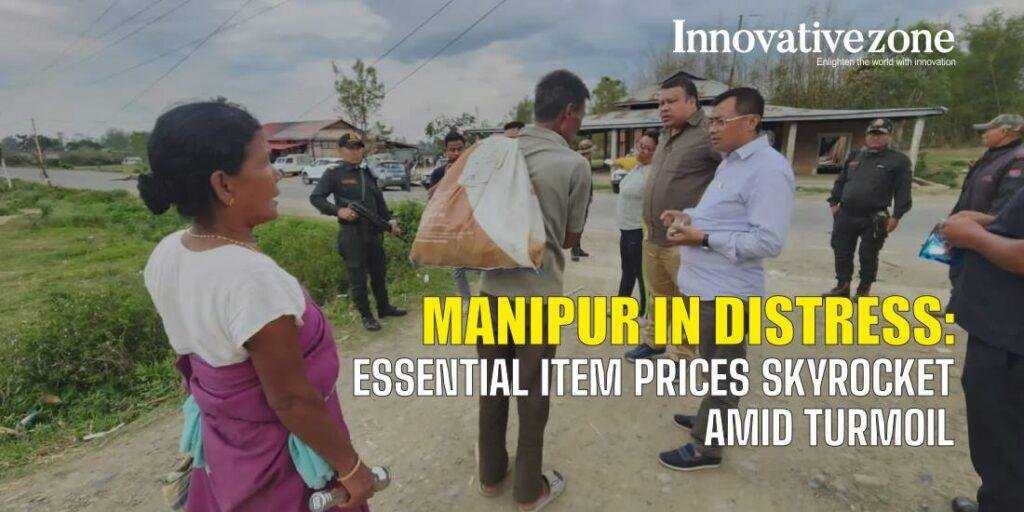Manipur in Distress: Essential Item Prices Skyrocket Amid Turmoil
Written by Sanjay Kumar
Manipur
State of India
- Chief Minister: N. Biren Singh
- Capital: Imphal (Executive Branch)
- Official animal: Sangai
- Districts: 16
- Points of interest: Keibul Lamjao National Park, Kangla Fort, MORE
The prices of essential commodities in Manipur have soared following the outbreak of ethnic violence three weeks ago. The import of products from outside the state has been disrupted, leading to several items being sold at double their usual price.
Across most parts of the landlocked northeastern state, the rates of items such as rice, potato, onion, eggs, LPG cylinders, and petrol have far exceeded the government-fixed prices.
Manglembi Chanam, a government school teacher in Imphal West district, stated, “Previously, a 50 kg bag of superfine rice cost Rs 900, but now it has risen to Rs 1,800. Prices of potatoes and onions have also increased by Rs 20 to Rs 30. In general, the prices of all essential commodities imported from outside have risen.” She further explained that LPG cylinders are being sold in the black market for Rs 1,800, and a liter of petrol costs Rs 170 in many parts of Imphal West district.
Chanam continued, “The prices of eggs have also increased, with a crate of 30 eggs now costing Rs 300 instead of the usual Rs 180. If it weren’t for the security forces escorting trucks carrying essential commodities, the price hike would have been even greater. Even potatoes had reached Rs 100 per kilo before the security forces intervened.”
Due to roadblocks and concerns among transporters following the clashes triggered by the Tribal Solidarity March on May 3, truck movement to the Imphal Valley came to a halt. A defence official remarked, “Consequently, the stock of essential supplies in the state declined, reaching critical levels, which necessitated planning movement through NH 37.”
Truck movement on NH 37 resumed on May 15, and the spokesperson assured that the security forces are dedicated to restoring complete normalcy.
Prices of key commodities also rose in districts that were less affected by the violence between the Meitei and Kuki communities, resulting in the death of over 70 people.
Rebecca Gangmei, a grocery shop and eatery owner in Tamenglong district headquarters, stated, “Prices of essential items, particularly rice, have seen a significant increase despite the absence of violence in our district. Only the prices of meat have remained relatively stable as it is sourced locally.”
Pamchuila Kashung, an assistant professor in a government college in Ukhrul district, expressed her fortunate proximity to Nagaland, from where essential items are sourced. However, Kashung mentioned, “Despite that, prices of some items, particularly rice, have increased.”
An official from the consumer affairs department emphasized that the government periodically sets prices, and anyone selling products above the prescribed rates can be penalized.
The state government issued a revised list of wholesale and retail prices for 18 food items several days after the outbreak of violence.
Although the violence in Manipur began on May 3, it followed tensions over the eviction of Kuki villagers from reserve forest land, which had already sparked a series of smaller protests.
Must Read:-
- Top 10 Largest Oceans and Seas in the World
- Top 10 automobile companies in India 2023
- Top 10 Electrical Companies in India 2023
- Top 10 Real Estate Companies in India-2023
- Top 10 most awaited & upcoming Hindi web series 2023-24
- Top 10 Clothing Brands in India 2023
- Top 10 best cultures in the world-2023
- Top 10 best country to work and live in 2023
- Top 10 best country for education 2023
- Top 10 Most Followed Celebrities on Instagram 2023
- The Inspiring Success Story of Bear Grylls
- Top 10 Business Coaches in The World to Guide Entrepreneurs In 2023
- Top 10 movies based on True Stories you must watch before you die
- Top 10 Best Online Doctor Consultation Apps in USA


